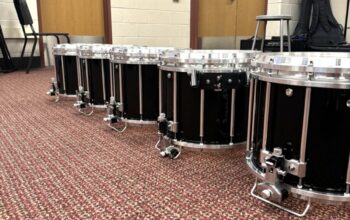
Emily Greene and Catherine Chiocchi
News Editor and Arts Editor
Senior year. That crucial milestone. It’s a time to deepen maturity, self-awareness, and personal passions — and at times it can seem like a social vacation akin to that of Ferris Bueller.
After college applications are finished, many seniors contract “senioritis,” because they see little academic worth in the rest of the school year. Why, these seniors ask, should they still even be in school?
Some state legislators have been asking the same question. Earlier this year, Republican Senator Chris Buttars of Utah proposed a plan to eliminate senior year for students who have already earned enough credits to graduate as a part of a statewide budget cutting effort. After receiving considerable backlash from the public, he revised his plan, making senior year optional instead.
Could this idea eventually become a reality? For students who choose to graduate early, it already is.
According to Principal Tony Pavia, few students at NCHS have chosen to take the unconventional route of graduating high school before the rest of their peers. “Maybe three students in the eight years that I’ve been at [NCHS] have chosen to graduate early,” Mr. Pavia said. “As long as they do it a year in advance and there is a clear, rational reason as to why, I am open to it.”
Former New Canaan resident and current freshman at Brigham Young University, Matt Young is someone who chose to take that path when he graduated early from his high school in Utah. “My senior year was completely irrelevant because I knew I wanted to get out of high school early and I knew I would be accepted into at least one of the colleges I wanted to go to,” Matt said. “My admissions were done after the second week of school and I just goofed off because my grades didn’t matter to any of the schools.”
Similarly, Allison Griffith elected to graduate a semester early from Joel Barlow High School in Redding this year because she had clear professional goals to pursue. She chose to follow her passion for musical theatre by taking an acting class at the New York Film Academy instead of spending her last semester in classes she felt she wouldn’t need later in life. “My school was not a good fit for me,” she said. “In the profession I want to go in, it would be more valuable for me to get work experience than to sit in a classroom for last semester.”
However, graduating early, like Matt and Allison did, is the atypical route for most high school seniors. Many faculty members believe that the senior year experience is an important milestone in life that is crucial for development. “I don’t think most kids are ready to be on their own at age 17,” Math teacher Wendy Guda said. “I think a lot of maturing happens the summer between your junior year and senior year, along with the development and exploration as you decide the first half of your senior year what you will do after high school.”
Susan Carroll of the College and Career Center agreed with Ms. Guda. “I think senior year is important for a lot of reasons, some academic some social,” she said. “For some kids, the light bulb goes off a little later in their head and they don’t get into their academic stride until their junior year. So by senior year they have a much more mature way of looking at the importance of learning for learning’s sake.”
And, as demonstrated by the enormous amount of school spirit during spirit week, homecoming and the holiday assembly, senior year also holds many social opportunities for students. Matt attributes this fact to one of the reasons he graduated early. “I had no connections with any of the sports teams, so there was no reason to stay,” Matt said. “I guess this would mean senior year is a social event.”
Being a senior also gives students the chance to be the “top of the totem pole” and take the lead in athletics, clubs, and the classroom. “Socially, younger students need seniors to look up to. [Senior year] is a chance to have stronger leadership in the school,” Ms. Carroll said.
However, the social aspect of high school is also given the majority of the blame for the supposed “senior slump” that starts affecting seniors second semester. “Yes, we’ve perpetuated the myth of ‘the senior slump,’” Ms. Guda said. “But you only are going to slump as much as you are comfortable with and as much as teachers let you.”
Colleges have recently begun paying attention to the rest of one’s senior year. “There are so many kids applying to college now, so if you slack off a lot the college can easily rescind your invitation to join the freshman class and can take somebody off the wait list who chose not to slack off,” Ms. Carroll said.
College admissions officers do take the time to review senior grades for their incoming freshman class. In her book A is for Admission, Michele A. Hernandez, former Assistant Director of Admissions at Dartmouth College, mentioned that she would personally examine each admitted student’s file to track their grades. If she noted any significant change in class rank or any grades dropping from A’s to C’s or D’s, she would look into the situation and then decide whether or not to send a letter to that student asking them to explain themselves. “Roughly from six to eight students a year are denied admission to Dartmouth based on an academic decline or a serious disciplinary infraction,” Ms. Hernandez writes. “Even if the admissions office accepts your explanation, you start out your freshman fall under the surveillance of the first-year office.”
Despite the possibility of a rescinded acceptance, senior Madeline Zeiss, who was accepted early decision to Dartmouth College, is allowing herself more time to relax instead of stressing about grades. “I still want to do well on AP exams, but I don’t need to worry about grades as much [now that I’ve been accepted],” she said. “Since I’m not as stressed out now, it’s easier to do well in my classes because each grade is not the end of the world.”
Administrators throughout the district have been working to combat the “senior slump” so students always feel engaged in their academic careers. Dr. David Abbey, Superintendent of New Canaan Public Schools, hopes to start an internship program for seniors either this year or next year. “To strengthen senior year, one of the options is a proposal to start an internship program, so after AP exams seniors will have the opportunity to partake in non-paying internships throughout the community,” Dr. Abbey said. “We hope they will gain vital information about the transition from high school to college and the workforce.”
Scarsdale High School in New York already has a similar idea in place. According to the school’s website, seniors take final exams the end of April and then begin work on their “Senior Option” in May, which is an independent project of their choice and a graduation requirement.
State officials are also reworking the current structure of high school to expand options for students on a “move on when ready” basis. Connecticut signed on to pilot the Board Examination System next year as a part of a school reform program spearheaded by the nonprofit organization, National Center for Education and the Economy. This system would allow students to graduate high school as early as the end of their sophomore year.
“High school hasn’t changed much in structure for 60 or 70 years,” Tom Murphy, Public Information Officer for the Connecticut State Department of Education, said. “The world is changing, so it makes sense to bring the high school program into the 21st century. We’re working towards providing additional options for students. If a student is ready for college early, they shouldn’t be forced to sit in high school for four years.”
According to Mr. Murphy, the Board Examination Program would be an opportunity for students to “fast-track” their high school program by “testing-out” subjects that demonstrate the skills and knowledge they’ve acquired. These tests would be similar to AP examinations in style and have been endorsed by the College Board. This system has already had great success in Europe.
However, if students pass the examinations, they aren’t required to immediately continue on to college; students could continue taking courses of their choice at their high school, enroll in a community college, or pursue job opportunities. The program would be strictly voluntary, and Mr. Murphy stresses that it is not for everyone. The first class with the option to take the tests will be the class of 2013, and Mr. Murphy anticipates about one thousand students will participate statewide in its first year.
Mr. Murphy noted that the implementation of this program is meant to expand options, not take any away. He feels each student should be able to tailor their time in high school to their own needs so they can avoid a “slump” period. “We are trying to be as flexible as we can because that’s what the 21st century is all about,” he said. “We want to give students more opportunities so they are always excited about learning.”



